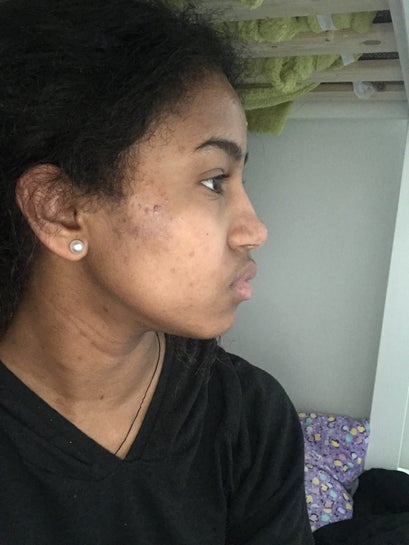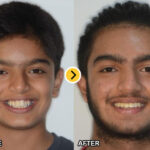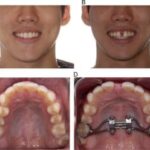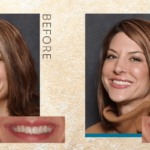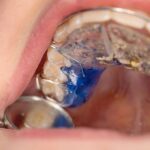One of the main causes of a narrow jaw is genetics. If one or both parents have a narrow jaw, there is a higher chance that their child will inherit the condition. Additionally, certain genetic disorders, such as Treacher Collins syndrome or Pierre Robin sequence, can also result in a narrow jaw.
Developmental issues during fetal growth can also contribute to a narrow jaw. Insufficient growth of the lower jaw during pregnancy can lead to a narrower jaw structure. This can be caused by factors such as poor nutrition, exposure to harmful substances, or certain medications taken during pregnancy.
Some common symptoms of a narrow jaw include difficulty chewing or biting, crowded or misaligned teeth, speech problems, and facial asymmetry. In severe cases, a narrow jaw can also affect breathing and cause sleep apnea or snoring.
Treatment options for a narrow jaw depend on the severity of the condition and the underlying cause. In some cases, orthodontic treatment, such as braces or aligners, may be recommended to correct dental issues and improve jaw alignment. In more severe cases, surgical intervention, such as jaw expansion or jaw advancement surgery, may be necessary to widen or reposition the jaw.
Genetics and Narrow Jaw
A narrow jaw can be caused by various factors, and one of them is genetics. The shape and size of our jaw are determined by our genes, which we inherit from our parents. If your parents or close relatives have a narrow jaw, there is a higher chance that you might also have one.
Genetics play a significant role in jaw development. Certain genes can affect the growth and development of the jawbone, resulting in a narrower jaw structure. This can lead to various dental and orthodontic issues, such as misalignment of teeth, overcrowding, and difficulty in chewing or speaking properly.
How Genetics Influence Jaw Development
Other Factors Contributing to a Narrow Jaw
While genetics play a significant role in jaw development, other factors can also contribute to a narrow jaw. These include mouth breathing, temporomandibular joint disorder (TMJ), and sleep apnea.
Mouth breathing, often caused by chronic nasal congestion or allergies, can affect the growth and development of the jaw. Breathing through the mouth puts pressure on the muscles and bones of the face, leading to a narrower jaw structure over time.
Temporomandibular joint disorder (TMJ) is a condition that affects the jaw joint and the muscles surrounding it. TMJ can cause jaw pain, difficulty in opening or closing the mouth, and can also contribute to a narrow jaw.
Sleep apnea, a sleep disorder characterized by interrupted breathing during sleep, has been linked to a narrow jaw. The repeated collapse of the airway during sleep can put pressure on the jaw, leading to its narrowing over time.
Mouth Breathing and Narrow Jaw
A narrow jaw can be caused by various factors, one of which is mouth breathing. When a person breathes through their mouth instead of their nose, it can lead to changes in the structure of the jaw over time.
Mouth breathing can occur due to a variety of reasons, including allergies, sinus problems, nasal congestion, or simply habit. Regardless of the cause, chronic mouth breathing can have detrimental effects on the development of the jaw.
Furthermore, mouth breathing can also affect the position of the tongue. Normally, the tongue rests against the roof of the mouth, exerting gentle pressure that helps to shape the jaw and promote proper dental alignment. However, when a person breathes through their mouth, the tongue often rests on the lower jaw, causing it to narrow and potentially leading to dental issues such as crowding or malocclusion.
Temporomandibular Joint Disorder and Narrow Jaw
A narrow jaw can contribute to the development of temporomandibular joint disorder (TMJ). TMJ is a condition that affects the joints and muscles of the jaw, causing pain and dysfunction. When the jaw is narrow, it can put extra stress on the temporomandibular joint, leading to inflammation and discomfort.
One of the main causes of TMJ is a misalignment of the jaw. When the jaw is narrow, it can affect the way the upper and lower teeth fit together, causing the jaw to become misaligned. This misalignment can put strain on the temporomandibular joint, leading to TMJ symptoms.
Treatment options for TMJ and a narrow jaw can vary depending on the severity of the condition. In some cases, orthodontic treatment may be recommended to widen the jaw and correct any misalignment. This can help alleviate the strain on the temporomandibular joint and reduce TMJ symptoms.
In more severe cases, surgery may be necessary to correct the narrow jaw and relieve TMJ symptoms. This can involve procedures such as jaw surgery or joint replacement. However, surgery is typically considered a last resort and is only recommended when other treatment options have been unsuccessful.
In addition to orthodontic treatment and surgery, other conservative treatment options for TMJ and a narrow jaw may include pain management techniques, such as heat or cold therapy, physical therapy exercises to strengthen the jaw muscles, and the use of oral appliances, such as splints or mouthguards, to help alleviate symptoms.
Sleep Apnea and Narrow Jaw
A narrow jaw can contribute to the development of sleep apnea, a potentially serious sleep disorder. Sleep apnea is characterized by pauses in breathing during sleep, which can lead to fragmented sleep and a variety of health problems.
When the jaw is narrow, it can restrict the airway and make it more difficult for air to flow freely during sleep. This can result in episodes of apnea, where breathing stops for a few seconds or longer. These episodes can occur multiple times throughout the night, disrupting the sleep cycle and preventing the individual from reaching deep, restorative sleep.
People with a narrow jaw may also be more prone to other risk factors for sleep apnea, such as obesity and a large neck circumference. The combination of a narrow jaw and these other risk factors can increase the likelihood of developing sleep apnea.
Common symptoms of sleep apnea include loud snoring, excessive daytime sleepiness, morning headaches, and difficulty concentrating. If left untreated, sleep apnea can lead to more serious health problems, including high blood pressure, heart disease, and stroke.
Treatment options for sleep apnea related to a narrow jaw may include lifestyle changes, such as weight loss and avoiding alcohol and sedatives before bed. In some cases, a continuous positive airway pressure (CPAP) machine may be recommended to help keep the airway open during sleep.
In more severe cases, surgical interventions may be considered to address the underlying narrow jaw. These procedures can help widen the airway and improve breathing during sleep.
Symptoms of a Narrow Jaw
A narrow jaw can lead to a variety of symptoms that can affect both your oral health and overall well-being. Here are some common symptoms that may indicate a narrow jaw:
Dental Crowding
One of the most noticeable symptoms of a narrow jaw is dental crowding. When your jaw is too small to accommodate all your teeth properly, they may become crowded and overlap each other. This can make it difficult to clean your teeth effectively and increase the risk of tooth decay and gum disease.
Malocclusion
A narrow jaw can also cause malocclusion, which refers to an improper alignment of the upper and lower teeth when the jaw is closed. Malocclusion can lead to problems with biting, chewing, and speaking, as well as jaw pain and headaches.
Speech Difficulties
Individuals with a narrow jaw may experience speech difficulties, such as lisping or difficulty pronouncing certain sounds. This is because a narrow jaw can affect the positioning and movement of the tongue, making it harder to produce certain sounds correctly.
TMJ Disorder
A narrow jaw can contribute to temporomandibular joint (TMJ) disorder, which affects the joint that connects your jaw to your skull. TMJ disorder can cause jaw pain, clicking or popping sounds when opening or closing the mouth, and difficulty opening the mouth fully.
Headaches and Facial Pain
Headaches and facial pain are common symptoms associated with a narrow jaw. The misalignment of the jaw can put strain on the surrounding muscles and joints, leading to tension headaches and facial pain.
Sleep Disordered Breathing
A narrow jaw can also contribute to sleep disordered breathing, such as snoring and sleep apnea. When the jaw is narrow, it can restrict the airway and lead to breathing difficulties during sleep.
Treatment Options for a Narrow Jaw
| Treatment | Description |
|---|---|
| Orthodontic Treatment | Orthodontic treatment, such as braces or Invisalign, can be used to gradually widen the jaw and align the teeth properly. This treatment option is often recommended for mild to moderate cases of a narrow jaw. |
| Maxillary Expansion | Maxillary expansion is a procedure that involves widening the upper jaw. It can be done using a palatal expander, which is a device that applies gentle pressure to the roof of the mouth to gradually expand the jaw. This treatment option is commonly used in children to correct a narrow jaw. |
| Surgery | |
| Myofunctional Therapy | Myofunctional therapy involves exercises and techniques that aim to improve the function and coordination of the muscles in the face and mouth. This therapy can help correct oral habits that contribute to a narrow jaw, such as mouth breathing or improper swallowing. |
| Continuous Positive Airway Pressure (CPAP) | In cases where a narrow jaw is causing sleep apnea, a CPAP machine may be recommended. A CPAP machine delivers a constant flow of air pressure to keep the airway open during sleep, reducing the symptoms of sleep apnea. |

Dr. Fidel Cann: Esteemed orthodontist with a lifelong dedication to enhancing smiles and oral health. Pioneering expertise, compassionate care.
